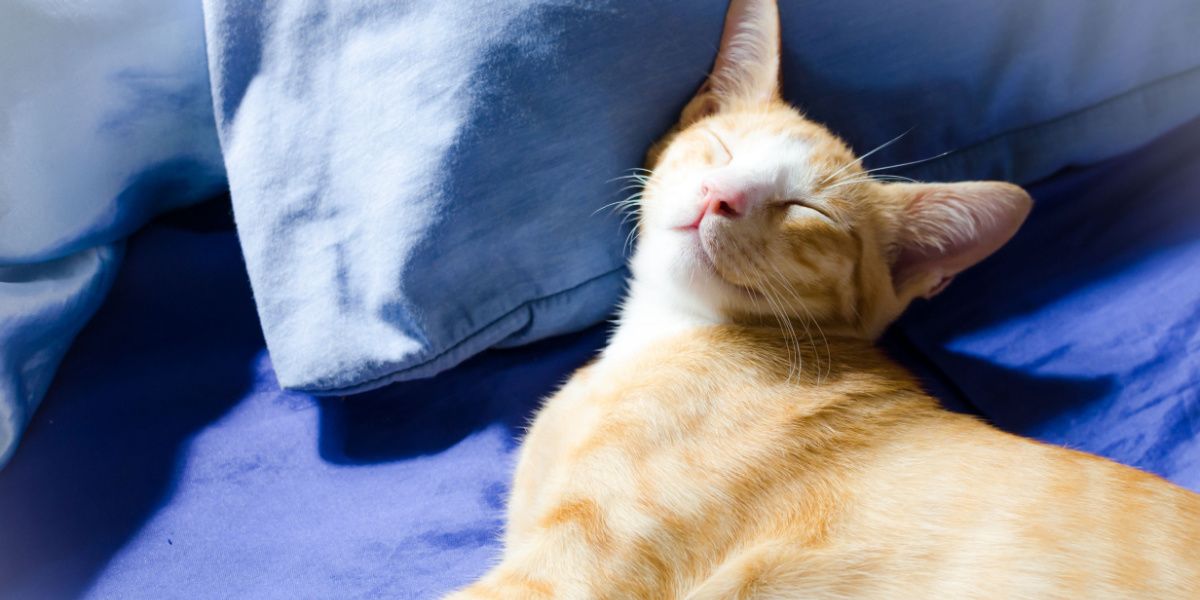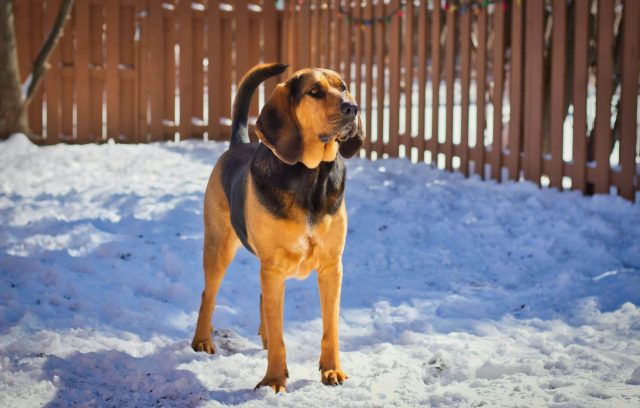
Have you ever looked lovingly at your cat and wondered whether they’re smiling back at you? Those upturned lips, narrowed eyes, and sometimes open mouth, all can give the impression that your cat is grinning. Cats do have the ability to use their facial muscles in the way that humans do when they smile. In other words, they are able to raise their lips and display their teeth.
Key Takeaways
Cats experience similar emotions to humans but usually express them in very different ways. Cats often look as though they have a natural smile but they don’t smile to express happiness in the way that humans do.
Cats narrow their eyes and slowly blink when they are happy and use this expression as a way of communicating with their owners. Cats also respond to humans that blink slowly at them, by slowly blinking back at them.
Cats have many different ways of expressing their emotions and a happy cat might also purr, chirp, knead, head butt you, and stick their tail straight up in the air.
However, whilst the facial expressions of your cat might sometimes physically resemble a human grin, cats do not ‘smile’ in the way that humans do to express their feelings of happiness.
In fact, a cat that pulls their lips upwards and displays their teeth is usually feeling defensive or actively sniffing their environment. That being said, your cat has many alternative ways in which they communicate that they are feeling happy.
How Cats Communicate Their Feelings of Happiness
1. Slow Blinking
The cat equivalent of the human smile is the slow blink. When your cat narrows their eyes and blinks slowly at you, they’re actually smiling with their eyes. In fact, research has shown that when humans narrow their eyes, they become more attractive to cats.
Many cats will even return this expression of narrowed eyes and slow blinking to a human who is displaying it. Try giving it a go the next time your cat is relaxed and see if they ‘smile’ right back at you!
2. Purring
Purring is well known to be a sign of a happy and contented cat. Cats will also sometimes purr when they’re afraid or in pain but it’s usually easy to tell the difference depending on the context of the situation. If your cat is relaxing on your knee and enjoying some chin rubs whilst purring, chances are you have a pretty happy cat!
3. Head butts
When your cat knocks their head gently against you and rubs their cheeks on you, they are ‘marking’ you as theirs with scent from glands that are just in front of their ears. This act of head butting is also referred to as ‘bunting’ and demonstrates that your cat is happy and relaxed in your company. Your cat might greet you this way when they first see you in the morning, or when you return home after work.
4. Kneading
Cats often knead at soft surfaces when relaxed, sleepy and contented – this is sometimes called ‘making biscuits’.
Many cats will ‘knead’ when they’re feeling happy and relaxed. It might be a blanket, your lap, or their bed but the act of kneading is thought to be an instinct behavior that remains from kittenhood when newborns knead their mom and her mammary glands to stimulate the production of milk. This is also why some cats drool when they knead – they are instinctively anticipating food.
As well as being a comforting action that reminds your cat of security and feeding, kneading also releases ‘happy’ pheromones from scent glands in their paws. Many cats will also narrow their eyes whilst kneading – a true expression of happiness.
5. Vocalizing
Some cats will meow or chirp when they are happy. Again, you need to look at the context of the situation as some cats will meow when they’re frightened or in discomfort but if your cat is chirruping away to you as a greeting, or when they’re being petted, chances are they’re just happily chatting away to you.
6. A Straight Tail
Your cat’s tail position can often tell you a lot about their mood. Cats that hold their tail upright are usually happy to see you. If your cat is holding their tail between their legs, it can mean that they are worried or frightened. When a cat whips or thrashes their tail, it usually means that they’re annoyed or agitated.
Also Read: What Your Cat’s Tail Can Tell You
Cat Expressions That Could Be Mistaken for a Smile
Cats’ naturally up-turned lips can give the impression of smiling – just another reason they’re so cute!
Their Normal Face
A cat’s mouth is often naturally turned up at the corners which can definitely look like they are smiling when in fact, this is just how their face looks! Think ‘resting smile face’!
The Flehmen Response
Cats have an interesting dual scent mechanism, whereby they not only detect smells using their noses but also by a tiny organ called the vomeronasal organ (also known as the Jacobson’s organ) on the roof of their mouths.
This allows a cat to detect pheromones (chemical messengers) by opening their mouth. They also sometimes curl their lips which helps to pass scent over the vomeronasal organ – a motion called the flehmen response, which can look a little like a human smile.
Baring of Teeth
Cats will often pull their lips up and bare their teeth as a warning to other cats, predators, or sometimes humans. It might look a bit like a wide smile but it actually means ‘back off’ – quite the opposite of a smile! You’ll usually be able to tell that this isn’t a friendly expression as it’s often accompanied by growling, hissing, and spitting!
How Can I Make My Cat Happy?
There are many ways to spend quality time and bond with your cat, including cuddling, grooming and playing.
There are plenty of things you can do to ensure your cat is happy and contented. Be sure to spend plenty of quality time with your cat, petting them, playing with them, and sitting with them (or allowing them to sit on you if this is what they enjoy!).
Never force an interaction with your cat as this can make them stressed, but be sure to make yourself available for strokes, cuddles, and playtime when they want them.
Simply getting to know your cat and their likes and dislikes is one of the best ways to ensure that they are happy. Many cats enjoy treats but just ensure that they are fed in moderation and are suitable for your cat. Ensuring that your cat is well cared for, fed a good quality diet, and provided with a regular routine, all make for a contented kitty.
Summary
Although cats do not smile in the literal sense that humans do, they have many other ways of communicating their feelings of happiness. One of the main ways in which cats smile is by narrowing their eyes and slowly blinking.
Cats will often communicate with their owners in this way and if a human blinks slowly at their pet cat, they will often return the gesture by narrowing their eyes and slow-blinking back at them. In other words, cats smile with their eyes instead of their mouths!
Frequently Asked Questions
What does it look like when a cat smiles?
Cats smile with their eyes rather than their mouths and a happy cat will often narrow their eyes and blink slowly. Slow blinking is thought to be the cat equivalent of the human smile.
Do cats understand smiling?
Experts do not believe that cats can distinguish between smiles and frowns. Cats do, however, understand the slow blink, which is the cat equivalent of the human smile. Cats have been shown to blink slowly back at humans who slowly blink at them.
Should you smile at cats?
If you’re a cat owner, a relaxed smile from you won’t upset your cat but they probably don’t understand what it means. Try the cat version of the smile – the slow blink. If you narrow your eyes and blink slowly at your cat, they might slowly blink back at you in response. Sustained eye contact can be interpreted as threatening by your cats so be sure to blink regularly.
Cats.com uses high-quality, credible sources, including peer-reviewed studies, to support the claims in our articles. This content is regularly reviewed and updated for accuracy. Visit our
About Us page to learn about our standards and meet our veterinary review board.
Humphrey T, Proops L, Forman J, Spooner R, McComb K. The role of cat eye narrowing movements in cat-human communication. (2020). Scientific Reports. 10 (16503). Retrieved August 12, 2023






